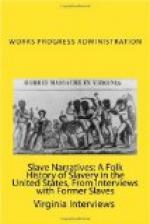Uncle George recalls a few superstitions entertained by the rivermen. “It was bad luck for a white cat to come aboard the boat.” “Horse shoes were carried for good luck.” “If rats left the boat the crew was uneasy, for fear of a wreck.” Uncle George has very little faith in any superstition but remembers some of the crews had.
Among other boats on which this old river man was employed are “The Atlantic” on which he was cabin boy. The “Big Gray Eagle” on which he assisted in many ways. He worked where boats were being constructed while he lived at New Albany.
Many soldiers were returned to their homes by means of flat boats and steam boats when the Civil War had ended and many recruits were sent by water during the war. Just after peace was declared George met Elizabeth Slye, a young slave girl who had just been set free. “Liza would come to see her mother who was working on a boat.” “People used to come down to the landings to see boats come in,” said Uncle George. George and Liza were free, they married and made New Albany their home, until 1881 when they came to Evansville.
Uncle George said the Eclipse was a beautiful boat, he remembers the lettering in gold and the bright lights and polished rails of the longest steam boat ever built in the West. Measuring 365 feet in length and Uncle George declares, “For speed she just up and hustled.”
“Louisville was one of the busiest towns in the Ohio Valley,” says Uncle George, but he remembers New Orleans as the market place where almost all the surplus products were marketed.
Uncle George has many friends along the water-front towns. He admires the Felker family of Tell City, Indiana. He is proud of his own race and rejoices in their opportunities. He remembers his fear of the Ku Klux, his horror of the patrol and other clans united to make life dangerous for newly emancipated Negroes.
George Taylor Burns draws no old age pension. He owns a building located at Canal and Evans Streets that houses a number of Negro families. He is glad to say his credit is good in every market in the city. Although lamed by rheumatic pains and hobbling on feet toeless from his young childhood he has led a useful life. “Don’t forget I knew Pilot Tom Ballard, and Aaron Ballard on the Big Eagle in 1858,” warns Uncle George. “We Negroes carried passes so we could save our skins if we were caught off the boats but we had plenty of good food on the boats.”
Uncle George said the roustabouts sang gay songs while loading boats with heavy freight and provisions but on account of his crippled feet he could not be a roustabout.
Federal Writers’ Project
of the W.P.A.
District #6
Marion County
Anna Pritchett
1200 Kentucky Avenue
Folklore
Mrs. Belle Butler—daughter
[of Chaney Mayer]
829 North Capitol Avenue




